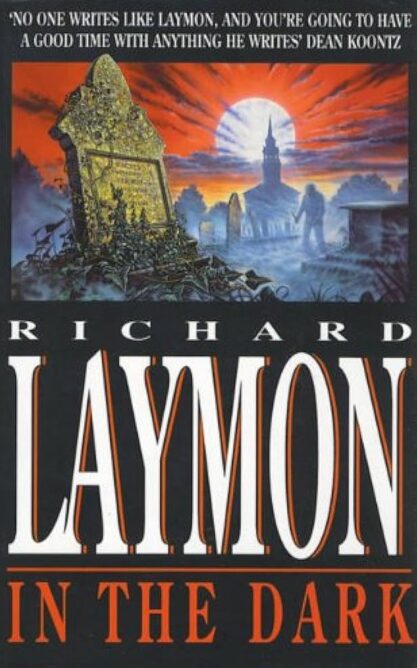 By RICHARD LAYMON (Headline; 1994)
By RICHARD LAYMON (Headline; 1994)
By 1994 the late Richard Laymon had been a professional writer for over fifteen years, and that accumulated skill illuminates IN THE DARK. It’s among his most highly regarded novels (and one of the only Laymon books to be adapted for the screen), and for its first two thirds I was convinced this was Laymon’s greatest-ever book, and one of the top horror novels of the nineties—but from there, unfortunately, things go downhill rather dramatically.
The set-up is certainly a grabber. It’s about Jane Kerry, a small town librarian who one night finds an envelope containing a fifty dollar bill and a note with cryptic instructions, written by an individual who identifies himself as MOG (Master of Games). When deciphered the instructions lead Jane to another envelope containing another puzzle, along with more money. Thus, against her better judgement Jane is drawn into an increasingly malevolent game that makes her steadily richer, but which has her perform increasingly dangerous acts.
She’s joined in her adventures by Brace Paxton, a hunky professor who serves as the obligatory love interest—and may just be MOG, a possibility Laymon makes sure to tease. He also offers up numerous surprises, with a cast of subsidiary weirdoes who serve as distractions and victims in a narrative that’s kept deftly balanced on the razor’s edge of believability. The heroine is a sweetheart, but finds herself constantly acting against her better nature, with her conflicted state conveyed via an inner monologue in which a mental proclamation is made, followed by an italicized rebuttal, a device that due to Laymon’s storytelling skill and facility for single-sentence paragraphs never feels forced or experimental.
Again, however, those attributes apply only to IN THE DARK’s first two thirds. Things collapse in the final 100 pages, which add in cannibalism, multiple murder, a hokey rescue and the type of sappy romantic angle the book’s earlier portions smartly eschewed. Clearly the literary high wire act Laymon was attempting, in which plausibility and reader identification are stretched to a breaking point, was unsustainable. He does at least offer a wholly unexpected last-minute twist involving MOG’s identity, but I say it’s strictly a case of far too little, way too late.
